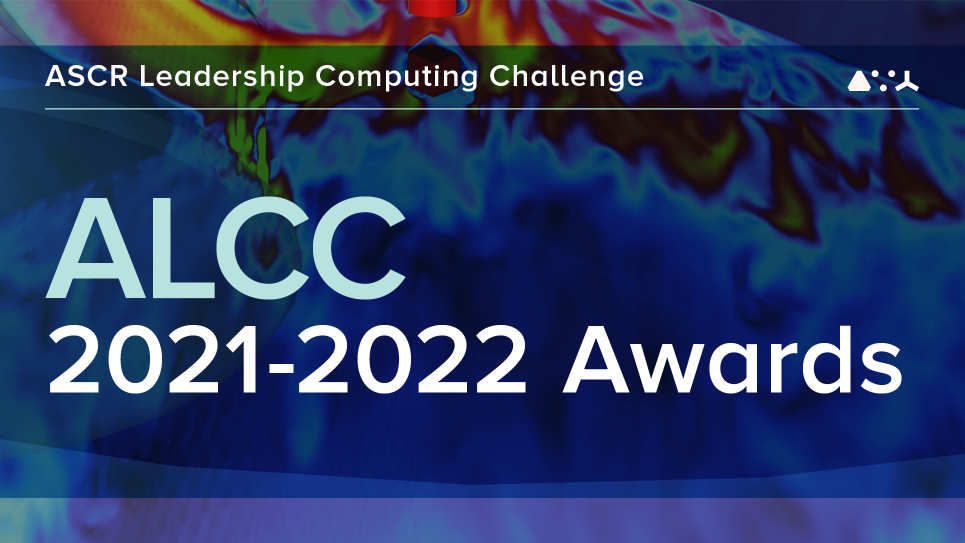
ALCC program awards ALCF computing time to 16 projects
DOE's ASCR Leadership Computing Challenge has selected a new set of projects for 2021-2022.
The U.S. Department of Energy’s (DOE) Advanced Scientific Computing Research (ASCR) Leadership Computing Challenge (ALCC) has awarded 16 projects totaling 6.75 million node-hours at the Argonne Leadership Computing Facility (ALCF).
Each year, the ASCR program, which manages some of the world’s most powerful supercomputing facilities, selects ALCC projects in areas that aim to further DOE mission science and broaden the community of researchers capable of using leadership computing resources.
The ALCC program allocates computational resources at ASCR’s supercomputing facilities to research scientists in industry, academia, and national laboratories. In addition to the ALCF located at DOE’s Argonne National Laboratory, ASCR’s supercomputing facilities include the Oak Ridge Leadership Computing Facility (OLCF) at Oak Ridge National Laboratory, and the National Energy Research Scientific Computing Center (NERSC) at Lawrence Berkeley National Laboratory. The ALCF, OLCF, and NERSC are DOE Office of Science User Facilities.
The 16 projects awarded time on the ALCF’s Theta supercomputer are listed below. Some projects received additional computing time at OLCF and/or NERSC (see the full list of awards here). The one-year awards begin July 1.
- Juan De Pablo from the University of Chicago received 45,000 node-hours for “Modeling of Polymeric Materials for Energy Storage Across Scales.”
- Rafael Gomez-Bombarelli from the Massachusetts Institute of Technology received 400,000 node-hours for “Inverse Design of Multicomponent Oxide Catalysts with Generative Models and DFT.”
- Phay Ho from Argonne National Laboratory received 316,000 node-hours for “Multimodal Imaging with Intense X-Ray Pulses.”
- Wei Jiang from Argonne National Laboratory received 1,032,000 node-hours for “Microscopic Insight into Transport Properties of Li-battery Electrolytes.”
- Eric Johnsen from the University of Michigan received 108,000 node-hours for “Cavitation Dynamics in the Spallation Neutron Source Target.”
- Ben Kirtman from the University of Miami received 1,000,000 node-hours for “Advancing Multi-Year to Decadal Climate Prediction with High-Resolution E3SM and CESM.”
- Gabriel Kotliar from Rutgers University received 115,000 node-hours for “Response Functions of LaNiO2: Insights into High-Temperature Superconductivity.”
- Alessandro Lovato from Argonne National Laboratory received 632,000 node-hours for “Quantum Monte Carlo Calculations of Nuclei up to 16O and Neutron Matter.”
- Po-Lun Ma from Pacific Northwest National Laboratory received 400,000 node-hours for “Multi-Scale Multi-Physics Ensemble Simulations for Aerosol-Cloud Interactions.”
- Parviz Moin from Stanford University received 650,000 node-hours for “Multiscale Bubble Breakup and Gas Transfer in Turbulent Oceanic Environments.”
- Jonathan Ozik from Argonne National Laboratory received 160,000 node-hours for “Probabilistic Comparative Modeling of Colorectal Cancer Screening Strategies.”
- Andreas Prein from the National Center for Atmospheric Research received 372,000 node-hours for “Improving the Representation of Mesoscale Convective Systems in Weather and Climate Models.”
- Igor Rakhno from Fermi National Accelerator Laboratory received 450,000 node-hours for “LBNF - PIP-II Optimization Studies for Megawatt 120-GeV Beams on Target.”
- Dillon Shaver from Argonne National Laboratory received 550,000 node-hours for “High-Fidelity CFD Simulations Supporting the Needs of Industry and the DOE.”
- William Tang from the Princeton Plasma Physics Laboratory received 45,000 node-hours for “AI/Deep Learning Prediction & Real-Time Control for Fusion Energy Systems.”
- Yiqi Yu from Argonne National Laboratory received 500,000 node-hours for “High-Fidelity Simulation of Flow and Heat Transfer Behavior to Support Conversion of Research Reactors with Involute-Shaped Fuel Elements to Low-Enriched Uranium.”
The Argonne Leadership Computing Facility provides supercomputing capabilities to the scientific and engineering community to advance fundamental discovery and understanding in a broad range of disciplines. Supported by the U.S. Department of Energy’s (DOE’s) Office of Science, Advanced Scientific Computing Research (ASCR) program, the ALCF is one of two DOE Leadership Computing Facilities in the nation dedicated to open science.
Argonne National Laboratory seeks solutions to pressing national problems in science and technology. The nation's first national laboratory, Argonne conducts leading-edge basic and applied scientific research in virtually every scientific discipline. Argonne researchers work closely with researchers from hundreds of companies, universities, and federal, state and municipal agencies to help them solve their specific problems, advance America's scientific leadership and prepare the nation for a better future. With employees from more than 60 nations, Argonne is managed by UChicago Argonne, LLC for the U.S. Department of Energy's Office of Science.
The U.S. Department of Energy's Office of Science is the single largest supporter of basic research in the physical sciences in the United States and is working to address some of the most pressing challenges of our time. For more information, visit https://energy.gov/science